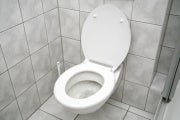You know, UNICEF estimates that 1.1 billion people worldwide don't have access to any kind of toilet or ways of eliminating waste. That, in turn, fouls drinking wate and can cause diarrhea, which spreads quickly. Unfortunately, there are around 1.5 millions childrens die with there infections each year.
“‘Toilet 2.0’ – that’s right, innovations in sanitation have a big, positive impact for billions without access,” Gates said
The Bill & Melinda Gates Foundation, which works to help people lead healthy, productive lives, announced on Tuesday their initiative to help bring safe, clean sanitation services to millions of people in the developing world who don’t have access to safe, reliable toilets.
“No innovation in the past 200 years has done more to save lives and improve health than the sanitation revolution triggered by invention of the toilet,” Sylvia Matthews Burwell, president of the foundation’s Global Development Program, stated at a sanitation and hygiene conference in Africa.
Brave New Toilet?
Unfortunately, the tried-and-true water closet of developed countries like Africa is too wasteful for poorer regions with limited sources of water. The Gates Foundation's Water, Sanitation & Hygiene department is working on two alternatives.
One low-tech solution supports the building of pit latrines in toilet-free areas. A second project gives grants to scientists who come with creative ways to dispose of wastes.
Some clever ideas for the "ultimate toilet" include:
- Create dry toilets that don't use water to flush, and which separate Number #2 from Number #1 to dry the solids
- Using bacteria to turn waste into compost
- Build toilets that turn urine into drinking water
- Use human urine to make nitrogenous fertilizer in powder form
Youtube
Facebook
Flickr
Blog
Ryan Leung












